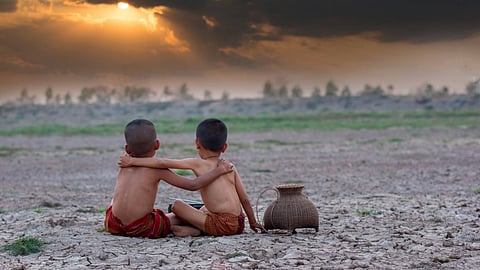An international team of researchers has warned of a ‘climate endgame’ due to effects of global warming, saying that it could lead to even human extinction.
They say temperature changes could become “catastrophic” for humanity if they are worse than many predict or cause cascades of events yet to be considered.
The potential for climate change to lead to worldwide societal collapse or even human extinction is a “dangerously under-explored topic”, the international team of researchers argues in a paper published recently in the journal Proceedings of the National Academy of Sciences.
Dr Luke Kemp, from the University of Cambridge’s Centre for the Study of Existential Risk, said: “There are plenty of reasons to believe climate change could become catastrophic, even at modest levels of warming. “Climate change has played a role in every mass extinction event. It has helped fell empires and shaped history. Even the modern world seems adapted to a particular climate niche,” he said.
“Paths to disaster are not limited to the direct impacts of high temperatures, such as extreme weather events. Knock-on effects such as financial crises, conflict and new disease outbreaks could trigger other calamities, and impede recovery from potential disasters such as nuclear war.”
They propose a research agenda for facing up to worst-case scenarios. These include outcomes from a loss of 10 per cent of the global population to eventual human extinction. More research is needed about “plausible worst cases”, the group of scientists led by the University of Cambridge have argued.
They write that there are “ample reasons to suspect that climate change could result in a global catastrophe”.
They say that analysing potential extreme consequences of climate change could “help galvanise action, improve resilience and inform policy, including emergency responses”. The authors say that climate breakdown would likely exacerbate other “interacting threats”: from rising inequality and misinformation to democratic breakdowns and even new forms of destructive AI weaponry.
One possible future highlighted in the paper involves “warm wars” in which technologically enhanced superpowers fight over both dwindling carbon space and giant experiments to deflect sunlight and reduce global temperatures. More focus should go on identifying all potential tipping points within “Hothouse Earth”, say the researchers: from methane released by melting permafrost to the loss of forests that act as “carbon sinks”, and even potential for vanishing cloud cover. The researchers have called on the Intergovernmental Panel on Climate Change to dedicate a future report to catastrophic climate change.
Dr Kemp and his colleagues argue that the consequences of 3°C warming and beyond, and related extreme risks, have been under-examined. The team behind the paper proposed a research agenda that includes what they call the “four horsemen” of the climate endgame: famine and malnutrition, extreme weather, conflict, and vector-borne disease. Co-author Prof Johan Rockstrom, director of the Potsdam Institute for Climate Impact Research, said: “The more we learn about how our planet functions, the greater the reason for concern.
“We increasingly understand that our planet is a more sophisticated and fragile organism. We must do the maths of disaster in order to avoid it.” Modelling done by the team shows areas of extreme heat (an annual average temperature above 29°C), could cover two billion people by 2070. These areas are not only some of the most densely populated, but also some of the most politically fragile. “Average annual temperatures of 29°C currently affect around 30 million people in the Sahara and Gulf Coast,” said co-author Chi Xu of Nanjing University. “By 2070, these temperatures and the social and political consequences will directly affect two nuclear powers, and seven maximum containment laboratories housing the most dangerous pathogens. There is serious potential for disastrous knock-on effects."
Last year’s IPCC report suggested that if atmospheric CO2 doubles from pre-industrial levels — something the planet is halfway towards — then there is an 18 per cent chance of temperatures rising beyond 4.5°C. However, Dr Kemp co-authored a “text mining” study of IPCC reports, published this year, which found that IPCC assessments have shifted away from high-end warming to focus increasingly on lower temperature rises. This builds on previous work he contributed to, showing that extreme temperature scenarios are “under-explored relative to their likelihood”. “We know least about the scenarios that matter most,” he said.

